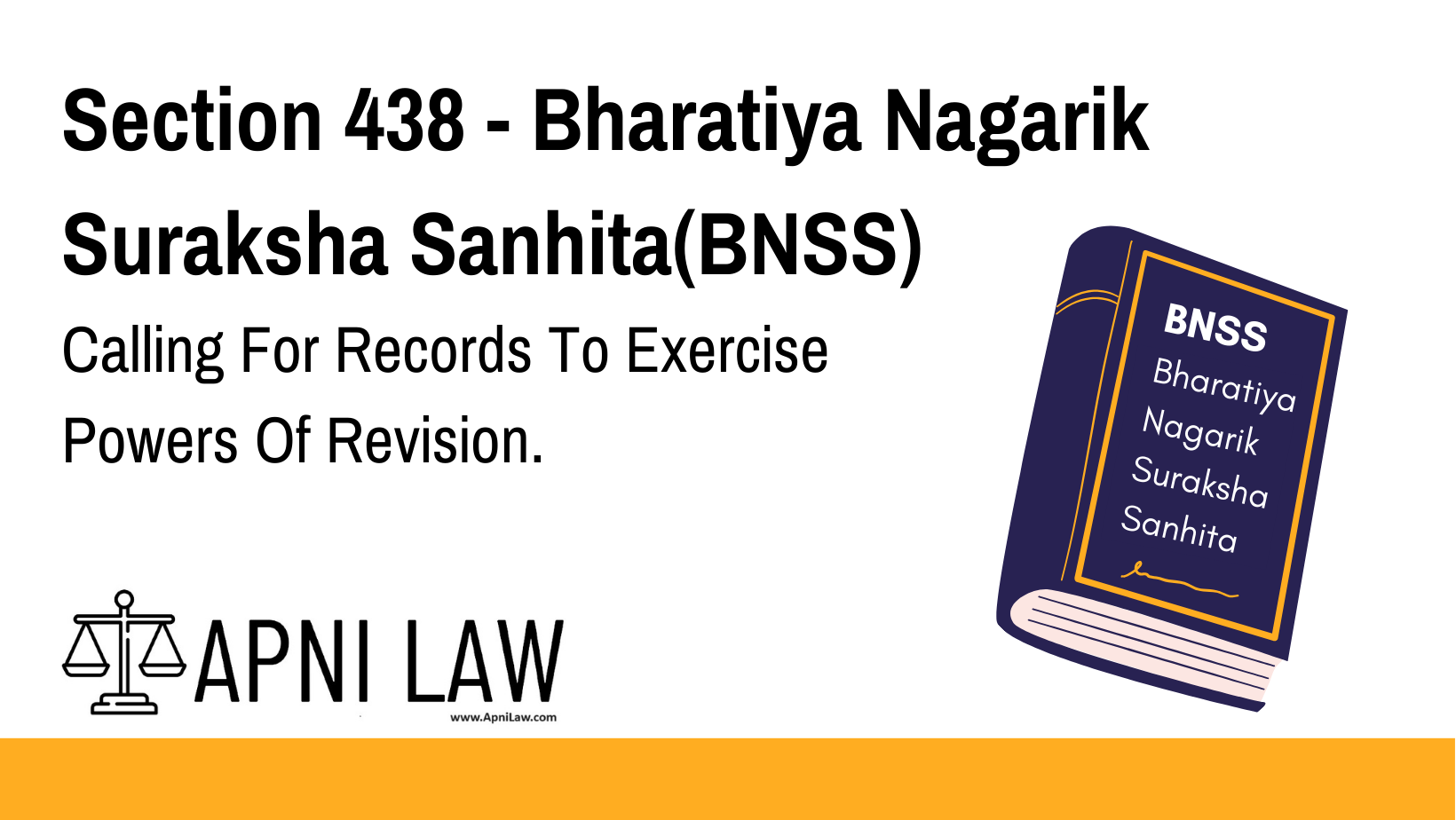Code: Section 438 BNSS
Section 438
(1) The High Court or any Sessions Judge may call for and examine the record of any proceeding before any inferior Criminal Court situate within its or his local jurisdiction for the purpose of satisfying itself or himself as to the correctness, legality or propriety of any finding, sentence, or order recorded or passed, and as to the regularity of any proceedings of such inferior Court, and may, when calling for such record, direct that the execution of any sentence or order be suspended, and if the accused is in confinement, that he be released on his own bond or bail bond pending the examination of the record.
Explanation: All Magistrates, whether Executive or Judicial, and whether exercising original or appellate jurisdiction, shall be deemed to be inferior to the Sessions Judge for the purposes of this subsection and of Section 439.
(2) The powers of revision conferred by sub-section (1) shall not be exercised in relation to any interlocutory order passed in any appeal, inquiry, trial, or other proceeding.
(3) If an application under this section has been made by any person either to the High Court or to the Sessions Judge, no further application by the same person shall be entertained by the other of them.
Explanation of Section 438 BNSS
Section 438 grants powers of revision to both the High Court and Sessions Judge. This means they can review the records of any lower criminal court proceedings within their jurisdiction to ensure the correctness, legality, and propriety of any decisions made by these courts.
Key Provisions:
- Power to Call for and Examine Records:
- Both the High Court and Sessions Judge have the authority to examine records from lower criminal courts within their jurisdiction to check whether the court’s findings, sentences, orders, and procedures were correct and lawful.
- Suspension of Sentence or Order:
- When reviewing such records, they can suspend any sentence or order that has been passed. If the accused is in jail, they may be released on bail or allowed to sign an own bond until the case is reviewed.
- Inferior Courts:
- Magistrates (whether executive or judicial) are considered inferior to the Sessions Judge for the purpose of revision and examination of records under this section.
- Limitations on Revision Powers:
- The revision powers cannot be used to examine any interlocutory orders (orders made during an ongoing case or process like an appeal, inquiry, or trial). Interlocutory orders are not subject to revision.
- No Double Applications:
- If an application for revision is made to either the High Court or the Sessions Judge, the other body (High Court or Sessions Judge) will not entertain another application on the same matter from the same individual.
Illustration
Example 1: High Court Reviewing a Criminal Case
A Sessions Court passes a sentence of imprisonment in a case, but a defense lawyer believes the sentence was too harsh or the legal process was flawed. The lawyer can request the High Court to review the case, ensuring the correctness of the judgment, and the High Court may suspend the sentence while the case is reviewed.
Example 2: Sessions Judge Examining a Lower Court’s Order
A Sessions Judge receives an application to examine a decision made by a Magistrate’s Court that sentenced an accused person. The Sessions Judge may review the record, check the legality of the sentence, and if necessary, suspend it and allow the accused to be released on bail.
Common Questions and Answers on Section 438 BNSS
1. What does it mean to call for and examine the record?
- Answer: This means the High Court or Sessions Judge reviews the written records and decisions of a lower court to check whether the proceedings were correct, legal, and fair.
2. Can the High Court suspend a sentence?
- Answer: Yes, the High Court can suspend the execution of a sentence or order while reviewing a case.
3. What is an interlocutory order, and can it be reviewed under this section?
- Answer: An interlocutory order is a temporary or procedural order made during an ongoing case. These types of orders cannot be reviewed under the revision powers granted by this section.
4. Can a person apply to both the High Court and Sessions Judge for revision on the same matter?
- Answer: No, if a person applies for revision to either the High Court or Sessions Judge, they cannot apply again to the other for the same issue.
Conclusion
Section 438 provides the High Court and Sessions Judge with the power to review the records of lower criminal courts to ensure justice, fairness, and legality in the findings, sentences, or orders. It also enables them to suspend a sentence or order while the review is ongoing. However, this revision power cannot be applied to interlocutory orders or be requested twice by the same individual.










